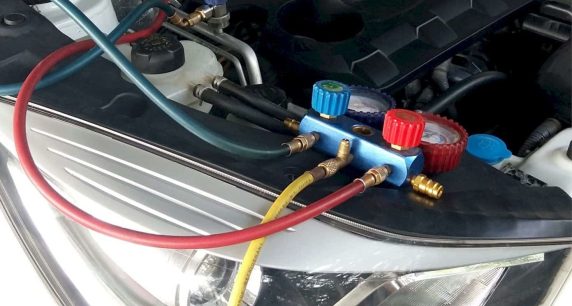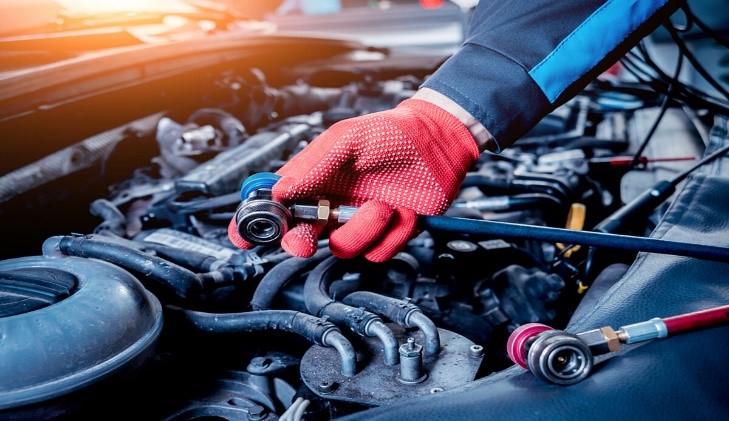Signs & Symptoms of an Overcharged AC

You may be familiar with how compressed gases rapidly cool down while expanding out to the atmosphere if you’ve ever held a compressed air tool after extended usage or aimed a compressed air hose at your face. A similar principle applies to your air conditioning system, which uses the cooling effects of expanding gas to cool the cabin’s air. Overcharging the AC system with coolant results in a system that behaves more like a large oil pump than a nozzle spraying cool, decompressing air into your face. However, that gas requires some place to expand and low pressure to expand into.
WHAT DOES AN “OVERCHARGED” A/C MEAN?
Every air conditioning system ever built has a maximum charge rate, and modern vehicles are no exception. This “maximum charge” specifies the maximum amount of refrigerant that a specific system can accept.
With this information, the concept of system overcharging is rather simple. An AC system gets overcharged when too much refrigerant has been added, which typically translates to a total system charge that is higher than what the system’s manufacturer intended.
A few unsettling symptoms, the majority of which are listed below, can appear if an A/C system is overcharged. To the dismay of any driver who depends on the performance of their air conditioning system for comfort, it is sufficient to explain that an overcharged A/C system is generally unable to operate at peak efficiency.
OVERCHARGED A/C SYMPTOMS
The presence of too much freon within a vehicle’s A/C system is often accompanied by a host of secondary symptoms. Recognizing these symptoms can prove valuable when attempting to quickly remedy the situation at hand.
The following are several of the most common symptoms associated with A/C system overcharging.
- Warm Discharge Air
When an air conditioner is overcharged, it rarely cools as it should and frequently releases lukewarm air via its vents. Refrigerant overcharging may be to blame if you recently topped up the refrigerant in your car but are still experiencing heat-related discomfort.
- Odd Noises
If you have just had your vehicle’s air conditioning serviced, only to now notice strange sounds coming from beneath the vehicle’s hood, it might be a good idea to have the system’s refrigerant charge checked once more.
System overcharging can cause an A/C compressor to struggle often causing an audible gurgling or whining sound.
- Irregular Pressures
Overcharging of an A/C system often causes high-side system pressures to skyrocket. System overheating can also come as a result, adding further insult to injury, and preventing any level of cooling from being achieved.
- Freezing of Suction Line
Freezing of an A/C systems suction line can easily occur at the hands of slight overcharging. This takes place primarily when the heat load into the evaporator is rather minimal, and freezing system temperatures are achieved.
What To Do

In any case, the overcharging problem with an automobile’s air conditioning system needs to be resolved right away. A car owner’s inaction could cause serious, irreparable component damage very fast. This can then result in the need for additional spending by the driver to restore full system functionality.
To get the appropriate charge rate, one must bleed their car’s air conditioning system. Unfortunately, most people do not have a refrigerant recovery machine available at home, so this will almost certainly require a trip to the service centre.
Since freon is designated by the EPA as an environmental toxin, venting refrigerant into the atmosphere is strictly prohibited.
Visit your local panel workshop immediately if you have any doubts about whether the A/C system in your car has been overcharged. It is much preferable to take immediate action to address the problem at hand than to let complacency led to system failure.
CAN OVERCHARGING DAMAGE THE A/C COMPRESSOR?
The compressor in an automobile’s air conditioning system could suffer serious consequences if the system is overcharged. This results from the fact that under such circumstances, a compressor is susceptible to significantly increased loading, which leads to severe fatigue.
Additionally, severe overcharging can cause the compressor to droop, which is a condition in which liquid refrigerant enters the compressor’s inlet side, frequently with disastrous results.
A significant amount of A/C compressor damage necessitates not only replacement but frequently whole system refurbishment as well. This is because there is a great chance that the system will get contaminated if debris from a broken compressor is driven downstream. In any case, repairing damage of this.



